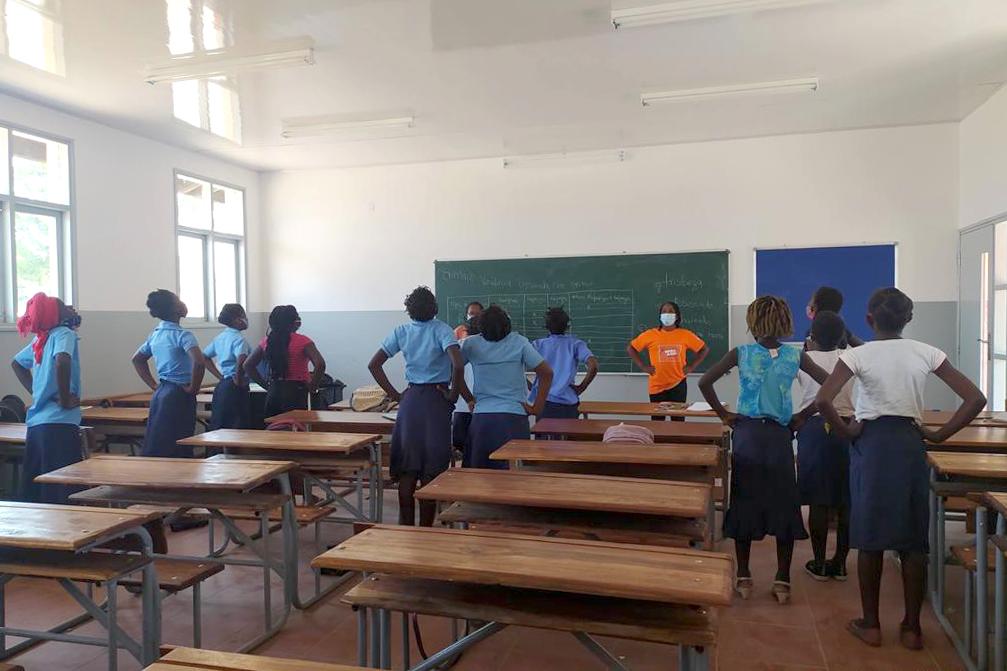Gender Violence and School Achievement in Mozambique
- Primary schools
- Students
- Men and boys
- Teachers
- Women and girls
- Dropout and graduation
- Enrollment and attendance
- Student learning
- Violence
- Aspirations
- Gender attitudes and norms
- Aggressive behavior
- Attitudes and norms
- Gender-based violence
- Mental health
- Information
- Engaging men in gender norms change
Gender-based violence (GBV) towards adolescents is prevalent in several low- and middle-income countries and can affect girls’ schooling outcomes, potentially contributing to gender gaps in education. Lack of information about how to respond to GBV may prevent victims from escaping violence. In Mozambique, researchers are evaluating the GBV and schooling impacts of implementing a GBV curriculum targeted at students.
الموضوع الأساسي
Gender-based violence (GBV) at the school environment is widespread in many low- and middle-income countries. Beyond being a problem in itself, GBV towards adolescents can further exacerbate gender disparities with respect to education, as it may reduce girls’ school attendance and increase their risk of dropping out of school.
In spite of the existing legal and institutional frameworks to address the issue, GBV crimes during adolescence often go unpunished. Lack of information is one factor that may prevent adolescent girls from escaping the violence cycle. For instance, adolescents may struggle to recognize what effectively constitutes GBV and thus hesitate to act upon it. Further, survivors and bystanders may be ill-equipped to respond to the aggression, lacking knowledge on how to seek support and report GBV cases.
Can the provision of information to girls and/or boys change social norms around tolerance and bystander behaviors, thereby reducing the incidence of GBV? Subsequently, does providing a GBV-targeted curriculum impact school attendance, performance, and school dropout through their impacts on GBV?
سياق التقييم
Gender-based violence (GBV) during adolescence is prevalent in several low- and middle-income countries and can be an explaining factor for gender gaps in schooling among adolescents. In Mozambique, GBV is considered one of the main risk factors associated with school dropout. As of 2016, about 60 percent of both male and female secondary students in the provinces of Gaza, Manica, and Nampulahad had heard of sexual violence in their schools. Further, 52 percent of students attributed sexual abuse and sexual violence to teachers, and 12 percent of students reported that they knew of other students who dropped out of the school due to sexual abuse and harassment.1
The Covid-19 pandemic has exacerbated these conditions along several dimensions. School closures likely have increased the risk of dropout, especially for girls. Additionally, the economic crisis that emerged with the pandemic is expected to increase violence against women and risk of child marriage, as documented in similar circumstances. Moreover, mobility restrictions may have had negative effects on children’s mental health, increasing impulsivity, anxiety, and risk of post-traumatic stress disorders, and resulting in violent behavior.
Addressing GBV in schools is a top priority for the Mozambican Ministry of Education (MINED). Under MINED’s agenda, the government created Gender Focal Points (GFPs), a national network of female teachers who are responsible for all matters related to gender inequalities within schools. GFPs receive specialized training on awareness related to gender aspects, including instances of early pregnancies, early marriages, and sexual abuse affecting students within and outside school facilities. This study made use of such networks with to address GBV risk factors in the province of Sofala, Mozambique.

معلومات تفصيلية عن التدخل
In collaboration with the Mozambique’s Ministry of Education, UNICEF, and a local GBV-focused non-profit called Girl Child Rights, researchers are evaluating the GBV and schooling impacts of the “Está na Hora de Agir!” program—a curriculum in GBV targeted to students in upper primary schools of Mozambique.
In this program, students in the last year of primary school received four monthly sessions of 1 to 1.5 hours where they watched videos, played reflection games, and participated in discussions led by GFPs. After each session, the GFP assigned students a game or activity to prepare for the next session. The sessions covered a range of topics, including: what type of actions constitute GBV, why violence is not acceptable, how to seek for support and where to report, and what are some proactive behaviors that victims, survivors, and bystanders can engage with.
Of the 340 participant schools, 85 were randomly assigned to the comparison group, where no intervention took place. To test if the interventions were more effective when specific groups were targeted to receive it, the remaining 255 schools were randomly selected to have the curriculum targeted at girls-only, boys-only, or girls and boys.
Researchers sampled 4,760 girls and 4,760 boys attending 6th or 7th grade (upper primary education) from these schools. Using surveys and administrative data provided by the Ministry of Education, they estimated the intervention’s impact on students’ recognition of GBV (i.e., ability to identify if students observe or are subject to GBV), GBV prevalence, GBV reporting, and schooling outcomes (primary to middle school drop-out rates and test scores). They also studied bystander engagement, perception of GBV presence in schools, aspirations for the future, attitudes on GBV, mental health, and perception of costs to perpetrators.
النتائج والدروس المستفادة بشأن السياسات
Research ongoing; results forthcoming.
Centro de Aprendizagem em Capacitação da Sociedade Civil. 2017. “Percepções dos Estudantes sobre o Assédio Sexual nas Escolas Secundárias: Usando o Cartão do Reporte do Cidadão”

